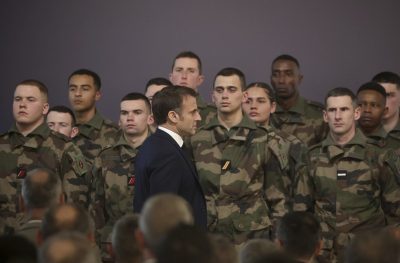France Isolated in Its Proposal to Send Troops to Fight Russia

All Global Research articles can be read in 51 languages by activating the Translate Website button below the author’s name (only available in desktop version).
To receive Global Research’s Daily Newsletter (selected articles), click here.
Click the share button above to email/forward this article to your friends and colleagues. Follow us on Instagram and Twitter and subscribe to our Telegram Channel. Feel free to repost and share widely Global Research articles.
Give Truth a Chance. Secure Your Access to Unchained News, Donate to Global Research.
***
France appears increasingly isolated in its decision to intervene directly in the Ukrainian conflict. Not even major Western powers are willing to openly confront Moscow on the battlefield, given the high likelihood of a catastrophic war arising as a result of such a move. Now, Berlin is already signaling that it will not support the French move.
According to the German newspaper Welt am Sonntag, the German government is preparing to publicly refuse its support for France’s anti-Russian military initiative. The outlet, citing sources familiar with state affairs, claims that French officials are pressuring several NATO members to cooperate in sending troops to Ukraine. Reports show that the French army’s chief of staff, General Thierry Burkhard, wrote a letter calling on the US and at least 10 other NATO countries to join Paris in intervening in Ukraine.
Germany, however, was not included in the French general’s letter, the sources say. This means that German officials have most likely already made it clear, in secret, to their French counterparts that they are not interested in directly participating in the conflict with Russia. According to the sources, during negotiations in Brussels, Germany, along with other countries such as Italy and Spain, ruled out the possibility of sending troops to Ukraine. If the pressure continues, Germany is expected to make a public statement denying aid to France.
In fact, the French proposal does not seem to be popular within NATO. Few countries have shown interest in cooperating with the sending of troops. Initially, the French soldiers would not be allocated to actual combat units, but to training and command centers. In addition, the French would have the mission of “protecting” strategic areas in key cities such as Odessa and Kharkov, trying to dissuade Russia from advancing in these regions.
However, none of this is enough to disguise the serious escalation initiated by France. Putting troops on the ground is officially entering the war, regardless of which unit the troops are deployed to. In practice, Paris is trying to reconcile two irreconcilable scenarios: going to war with Russia and avoiding a harsh response from Moscow. Obviously, Paris does not want to face the consequences of a direct war with Russia, but at the same time Macron wants to continue propagandizing his image as “leader and defender of Europe.” This scenario could easily end in tragedy.
Indeed, Macron is not acting naively. He certainly has a plan behind his dangerous idea of sending troops. Given the high number of French mercenaries killed by Russian forces in Ukraine, it is very likely that there is pressure in French society to provide an explanation for the losses. Many of these soldiers are not exactly mercenaries, but regular French commandos who fight for NATO’s interests in Ukraine, using the label of “mercenaries” to disguise Western interventionism. The French government needs to give society an explanation to why so many French citizens are dying on the front lines – and apparently, Macron has made the worst possible decision to “explain” these deaths.
It is possible that the real purpose of sending troops is to “legalize” the deaths of mercenaries. Thus, Macron could simply say that the losses occurred during direct hostilities between the French Army and Russian forces, providing an explanation for the families of the dead soldiers. There is, however, nothing rational or strategic about such a move. By disguising the already existing French involvement, Macron would be provoking an all-out war, putting the global security architecture at risk. Nevertheless, he appears increasingly isolated in his proposal, with the initiative being rejected by other states.
The only hope of preventing French interference from turning into open war lies with Russia itself. The Russians have repeatedly proven to be the rational side in the conflict, as Moscow is actually willing to avoid escalation. Russia does not want to go to war with NATO directly, even though the Atlantic alliance is already taking steps towards direct intervention – not only with Macron’s initiative, but also with other recent moves, such as authorizing cross-border strikes. Clearly, there is a scenario in which NATO wants war and Russia avoids it.
Of course, the Russians will do their best once again to avoid the worst-case scenario, but it is important for the West to understand that at some point Russian patience may run out. Moscow is not interested in starting an open conflict, but it has already made it clear that any French soldier in Ukraine is a legitimate target.
*
Note to readers: Please click the share button above. Follow us on Instagram and Twitter and subscribe to our Telegram Channel. Feel free to repost and share widely Global Research articles.
This article was originally published on InfoBrics.
Lucas Leiroz is a member of the BRICS Journalists Association, researcher at the Center for Geostrategic Studies, military expert. You can follow Lucas on X (former Twitter) and Telegram. He is a regular contributor to Global Research.
Featured image source

